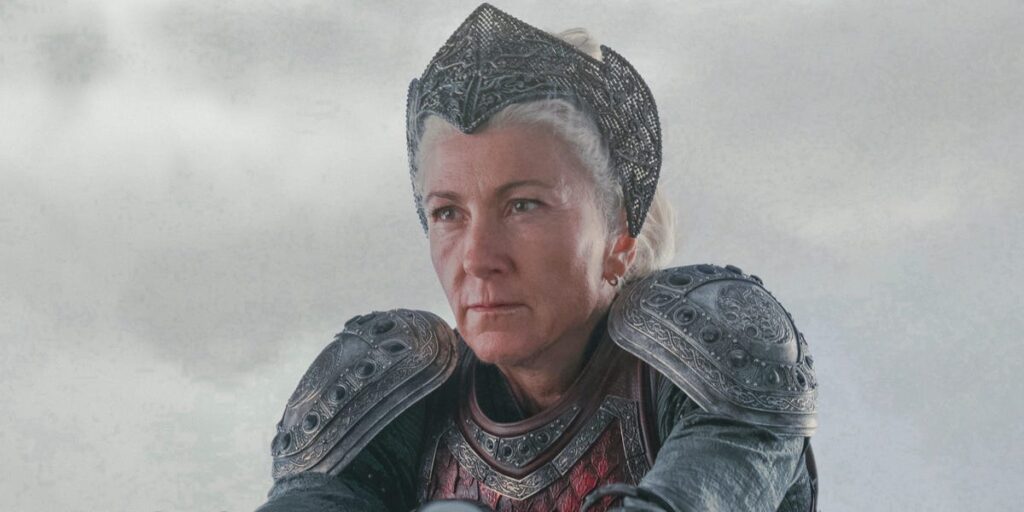Warning: Major spoilers ahead for season two, episode four of “House of the Dragon.”
Princess Rhaenys Targaryen knew that she was embarking on a suicide mission.
In episode four, Ser Criston Cole marches on Rook’s Rest, a modest castle close to Dragonstone. It’s a blatant provocation, but it works: Rhaenyra knows that she needs to send a dragon to counter Cole. Though both Rhaenyra and her son Jacaerys volunteer to go, it’s Rhaenys who claims the responsibility.
“You must send me, Your Grace,” Rhaenys says, leaving little room for argument. And in the moment, even for those who didn’t already know Rhaenys’ fate, her departure feels profoundly final. Rhaenys will not — and does not — return from this mission.
Best spoke with Business Insider about Rhaenys’ decision, the implications of unleashing dragon warfare in Westeros, and the practicalities of filming emotional sequences while on mechanical dragonback.
Rhaenys was the only choice to fly to Rook’s Rest
In season one, Rhaenys escapes King’s Landing with her dragon Meleys, bursting into King Aegon’s coronation on dragonback. In that moment, she decides not to kill him, telling Daemon that the war was not hers to start.
Best says showrunner Ryan Condal told her that in the world of “House of the Dragon,” dragons are akin to nuclear weapons.
“She deliberately, at the end of episode nine, chose not to start a nuclear war, very rightly,” Best told BI. “And she spent the whole of season two doing everything she possibly can to steer everybody away from nuclear war. She’s the one person, the one voice of sanity, and reason, and wisdom, and experience, because she and Corlys are the only grown-ups left in the room.”
By episode four, Rhaenyra has exhausted all other options to evade war, including traveling to King’s Landing herself to plead with Alicent. By the time Criston advances on Rook’s Rest, she’s no longer reluctant to send out her dragons.
Best told BI that on a practical level, Rhaenys was the right choice — and the moment allowed her to fulfill one of her desires for the character.
“She’s the equivalent of Rhaenyra’s Lancelot,” Best said. “She’s their best knight. And it’s the honorable, warrior choice. I said to Ryan at the end of season one, ‘I really want in season two for her to go full samurai,’ because in season one she’d been absolutely ambiguous. She’d kept her cards so close to her chest, she’d played the political game.”
Best told BI that the small council scene in which Rhaenys volunteers to fly to battle wasn’t always so clear-cut. In the original draft of the scene, Rhaenys tells Rhaenyra, “Send me.” But the production revisited the sequence during reshoots, leading to a small but impactful dialogue tweak courtesy of producer Sarah Hess: “You must send me.”
“Then it becomes an instruction, and it’s then the final piece of guidance to Rhaenyra,” Best told BI. “What she’s doing is showing her how to be a good leader and how to rule, and this is what you do. You don’t go in yourself because that’s too risky for the bigger picture. You send in your best fighter.”
Still, Rhaenys knows that she’s crossing the point of no return, Best said. Though she’s confident in volunteering herself and Meleys, she doesn’t expect to come back.
“It has to be a sacrifice, because I feel that for Rhaenys, she’s done everything to not have this war,” Best told BI. “Whoever crosses that line can’t continue. There’s no living after that. It has to be a sacrificial mission.”
Rhaenys still exercises restraint during her final battle
Rhaenys’ actual death comes during a three-way dragon fight between Meleys, Vhagar, and Sunfyre. The emotional impact of that battle hinges on Best’s performance. Director Alan Taylor, who also directed the series premiere, doesn’t hesitate to cut in close to her face as it becomes increasingly streaked with ash. Best effectively communicates Rhaenys’ resolve — and her resignation to death — over the course of several stark close-up shots.
What makes it more remarkable are the conditions under which Best acted out Rhaenys’ last moments. It took Best two weeks to film the sequence, working alone while on a mechanized mount. Rhaenys’ final moments were filmed amid the chaos of wind blowing in Best’s face and shouted directions as she mimicked difficult maneuvers on dragonback while “clinging on for dear life.”
“You are having to do the whole story in your head,” Best said. “Not just the battle, and seeing everybody and responding to the physical nature of the battle, but also obviously the emotional part of what’s going on inside, which is challenging in the context where there’s just nothing to relate to.”
During the battle, Best says that Rhaenys is still reluctant: despite the fact that they’re trying to kill her, Aegon and Aemond are still part of her family. During that sequence, Rhaenys is very specific in her commands to Meleys: she only orders the dragon to attack Sunfyre and Vhagar, even as her nephews commend dracarys — fire — with little discipline.
“It seemed to me that every time anybody was on a dragon and was saying dracarys, the human or person riding had reached a level of really high emotion, and it was very chaotic, and very vengeful, and very angry — not a lot of control,” Best said.
“It was very important to me that she was different from all of those others, that she was an utter pro to the last, with precision,” she continued. “That grace characterizes her.”
Read the full article here


